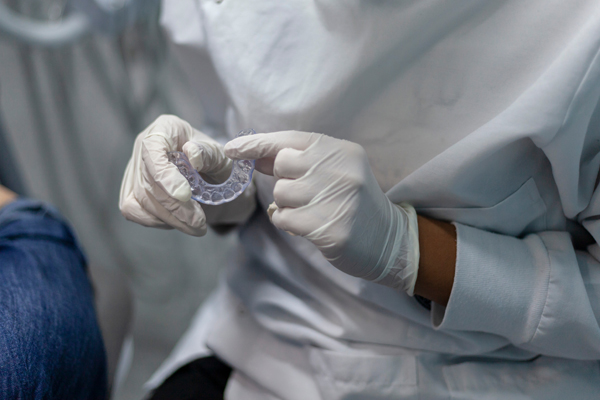The Pros and Cons of Clear Aligners

If you are thinking about getting clear aligners to straighten your teeth, it is helpful to first understand how they work. Many adults have had success with this solution and how it can restore smiles. There are benefits and drawbacks to this treatment. Your dentist can help you decide whether this option makes sense for you. You can also learn more and see whether it is right for you and your goals.
The problems with crooked teeth
It is not uncommon for a person to have alignment issues with their teeth. This can have several consequences. First, crooked teeth can affect the aesthetics of the person’s smile. It can be embarrassing to have crooked teeth. But there are health effects as well.
Misaligned teeth are more difficult to brush. As a result, the person may not clean them well enough, leading to cavities and gum disease. Crooked teeth can also be susceptible to damage. When teeth are not straight, there is a greater likelihood of pain and discomfort too.
Clear aligners do not stand out
Other teeth-straightening methods can be effective but hinder the person’s smile during treatment. These can be bulky, and other people can readily see them. Aligners are practically invisible, so others should not even notice them. This can make the patient less embarrassed to wear them.
Aligners are more comfortable
Because clear aligners are made of plastic, they will not cause soreness or irritate the mouth. The aligners will not cut up the person’s lips, tongue, or cheeks like other treatments. People who wear aligners do not have to worry about bleeding. This treatment can take less time to get used to as well.
Aligners have a fast treatment time
Another reason why patients prefer to wear clear aligners over other options is that the mouthpieces will not take as long to straighten the teeth. Some treatments can take two or three years to fix alignment issues. Aligners can accomplish this in as few as six months. Most patients should have a straighter smile in fewer than two years.
Aligners are for more mild issues
Patients who have severely crooked teeth may not have success with clear aligners. The dentist may not even recommend this treatment in this case. People who have crowded teeth may also want to choose a different treatment. Aligners are also not right for bite dysfunctions.
Aligners can get lost
People love that clear aligners are removable and do not have to stay in the mouth 24 hours a day. However, this can also be a drawback. Patients can have a tendency to misplace them. Aligners are also prone to ripping or tearing. Replacing them can be expensive.
Other pros
Clear aligners can correct one’s dental alignment without attracting negative attention. These aligners can disappear into one’s mouth. The patient does not need to explain the brackets and wires anymore. The removable feature of these aligners makes them attractive to most patients as well. Removing these aligners before eating means no awkward chewing and no limitations when it comes to food choices. The patient can also brush and floss without any problem since the patient must clean the aligners before placing them back into the mouth.
The removability of the clear aligners prevents the collection of bacteria and food particles between the teeth and aligners. This prevents the patient from developing gum and teeth issues, such as infections. Clear aligners also prevent the patient from experiencing broken wires or detached brackets. There will be no need to see the dentist every month for adjustments as well.
Other cons
The patient must be compliant while using clear aligners. This will allow the patient to maximize the benefits of the treatment. Wearing them 20 to 22 hours a day will be ideal. Shortening or skipping the hours will only prolong the treatment period. The soreness of the teeth will become more evident when the patient removes the aligners. It also limits the patient’s food choices.
Good candidates
Good candidates for clear aligners are those who have bite or crowding issues. The patient should be ready to dedicate hours of wearing the aligners for 20 to 22 hours a day. Being responsible enough to care for these aligners is also a sign that the patient is ready for this type of treatment. Another qualification is being self-conscious about wearing traditional metal braces. A person who loses things or does not care for things properly may do better with traditional braces.
Find the right way to fix your smile
If you are tired of the way your teeth work, talk to your dentist about doing treatment with clear aligners. Before long, you can have the attractive smile you have always wanted. Be aware that there are benefits and disadvantages to choosing this option. As you know about these, you can make a decision that you feel good about.
Are you considering clear aligners in the Port St. Lucie area? Get more information at https://www.stluciedentist.com.
Check out what others are saying about our dental services on Yelp: Clear Aligners in Port St. Lucie, FL.
Related Posts
A tooth fracture can occur from many causes, such as accidents, grinding teeth, eating hard foods, and aging. Fractured teeth do not heal themselves, so visiting your general dentistry professional in the event of a cracked, broken, or fractured tooth is always advisable.Cracks in your teeth can manifest in different ways. Some are painful and…
Dental health is a critical component of overall health, so patients need to find a dentist to coordinate regular preventative care and be the go-to person for dental procedures or emergencies. There are multiple options for people who need to find a new dentist.The process of finding a dentist generally begins with searching for dental…
A lot of general dentistry care is focused on the prevention of tooth decay. It is a common issue, and one that can be reversible in the early stages; however, if left untreated, it can become serious. Knowing the signs of tooth decay and understanding the risks of not giving it the proper care can…
General dentistry is essential for good oral health at every age. Some parents assume that children do not need routine dental care until permanent teeth start to arrive. However, children of all ages should see a dentist on a regular basis. Parents must also be mindful of their child's tooth and gum development and check…





